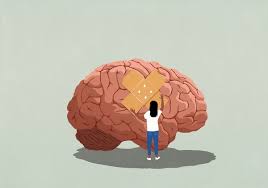
What are thought distortions? Thought distortions are exaggerated or irrational thought patterns that lead to negative thinking and emotions, influencing us to behave in a certain way. It’s a biased way of thinking because you’re (usually) assuming the worst or that something negative is going to happen when there is little to no evidence to suggest otherwise. There are several different ways we can distort our thoughts, so let’s explore a few.
One of the ways we distort our thoughts is with “all or nothing thinking.” That’s when we see things in extremes without acknowledging any sort of middle ground. It categorizes experiences as either good or bad, or a success or a failure. For example: “If I don’t get an A on this quiz, I am a complete failure.” This thinking distortion is often associated with perfectionism. This kind of thinking especially when you think this way all the time can lead to depression and anxiety.
Another thought distortion that we typically fall victim to is overgeneralization. That’s a distortion where we base a conclusion on a singular event leading us to negative thinking about the future. Overgeneralization often uses words like “always,” “never,” or “every” to express these assumptions. An example of this is “I’m never going to find love again.” This kind of thinking, although common, isn’t good. It can lead to depression, anxiety, and low self-esteem.
The last thought distortion that we will discuss is catastrophizing. Catastrophizing is when you just expect the absolute worst in a situation. It involves jumping to conclusions (another thought distortion) and making generalizations about potential negative outcomes. An example of this is “If I make a mistake in this presentation, my career will be over.” This kind of thinking can lead to anxiety, depression, and difficulty coping with stress.
There are so many other thinking distortions we didn’t discuss, however, these thinking distortions are all negative and in order to combat these thinking distortions, we have to acknowledge them when they occur and adjust our way of thinking. Sometimes that can be easier said than done, so some extra help with therapy or medication can help you combat these thinking distortions.

Leave a Reply